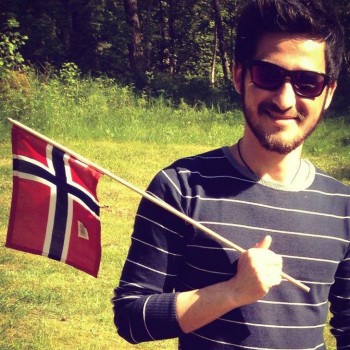Afghan interpreter Faizullah Muradi will be flown back to Norway on Thursday, after the immigration appeals board UNE decided he could stay in Norway while his asylum case is considered anew. The announcement followed revelations on Tuesday that it was Justice Minister Anders Anundsen himself who made the decision six months ago to deport Muradi.

Muradi was scheduled to return to Norway from Italy on Wednesday, after Anundsen issued a new decree to immigration agency UDI. All cases involving interpreters seeking asylum after helping Norwegian armed forces would now be processed in Norway. Muradi’s lawyer Arild Humlen told news bureau NTB that the 22-year-old needed to get some new documents in Italy, and would fly from Rome to Oslo on Thursday afternoon.
“I want to thank all my supporters in Norway,” Muradi said in a phone call to Norwegian Broadcasting (NRK). “Now I’m looking forward to coming home to Mandel again. I am very excited now.”
UNE decided Muradi could come back to Norway while UDI reprocessed his asylum application, clearing the final legal hurdle for his return. UDI initially refused to handle Muradi’s case, because the Dublin Regulation on the processing of refugees said applications should as a rule be processed in the country where the asylum seeker entered Europe. For Muradi that was Italy, but he had no residence rights there and risked being deported back to Afghanistan if both Norway and Italy rejected his case.
“UDI takes the responsibility for getting Faizullah Muradi to Norway, and is now working to arrange the practicalities for him to come back here as quickly as possible,” the immigration agency said.
No guarantees
Anundsen of the traditionally anti-immigration Progress Party told NRK it was a test case. The Ministry of Justice’s decision only concerned handling interpreters’ cases, and was not an “advance grant” of a residence permit.
“This is the first case of its kind where an Afghan interpreter has been handled after the Dublin Regulation,” Anundsen said. “The Muradi case has meant that we have changed the practice, and we now have a routine for how these should be handled. Asylum seekers will still be individually assessed in relation to the real need for protection. The processing of asylum application will be the same.”
The rule change came about after Prime Minister Erna Solberg bowed to pressure from the opposition, veterans and human rights organizations. After initially refusing to intervene in a UDI decision, she eventually instructed Anundsen to reconsider the government’s policy. However, it emerged on Tuesday that the government first became aware of Muradi’s case in December, and it was Anundsen himself who made the call to deport him.
Deportation was Anundsen’s decision
The Ministry of Justice received the case on December 20 last year, when UDI wrote to the ministry asking for advice on how to handle Muradi’s asylum application. UDI proposed sending him back to Italy, where he’d been held in relation to a people smuggling case for two years before coming to Norway. The letter stated that Muradi had worked as an interpreter for Norwegian forces in Afghanistan, and presented arguments for and against his handling under the Dublin Regulation.
Three months later, the ministry responded that it saw no reason to instruct UDI to do anything other than send Muradi back to Italy. Anundsen confirmed on Tuesday it was he who had responsibility for the decision. “It was me,” he told NRK. “All these cases are handled in a proper and thorough way in our ministry. It takes a lot for us to instruct in individual cases. At that point in time we believed that it could be processed in the ordinary apparatus.”
Political furore
Opposition politicians were outraged that the government itself had made the call, and only reversed its decision following widespread media coverage and condemnation. “This shows in all its hideousness that they do not take cases seriously before there is noise in the media, and they see that the case cannot withstand the light of day,” argued Karin Andersen of the Socialist Left party. “This shows that the rule of law does not stand at the front of the mind of the Ministry of Justice.”
Andersen said she took up Muradi’s case with Anundsen in writing twice in May, and received “woolly” answers. “This shows that when normal people take up cases, it is easy to dismiss them,” she said. “It has to be on television and across all platforms before they are willing to go into the merits of a case, and it cannot be like that. It shows that the rule of law is not there.”
“I hope this has been a lesson for them,” Andersen concluded. “When Norway engages the local population in areas where we are in conflict, and in that way help to put their lives in danger, then we have a moral responsibility to give them protection.”
“It is not like the Dublin Regulation says that Norway must send asylum seekers back to the first country, it says that they can do that,” said Christian Democrats leader Knut Arild Hareide. “In these types of cases it is completely wrong to lay the responsibility onto another nation.” Labour’s Helga Pedersen said the government never would have conceded if it had not been for veterans’ involvement in Muradi’s case.
newsinenglish.no/Emily Woodgate

